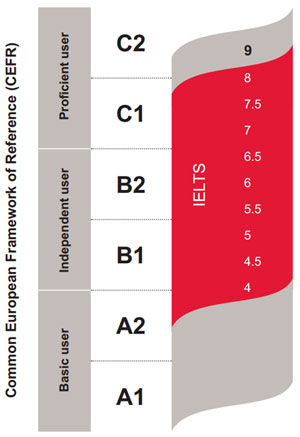What is IELTS
An International English Language Test (IELTS), designed to help people work, study or migrate to a country where English is the native language.
Your ability to speak, listen, read and write is assessed through a test. The test is graded from 1-9.
- IELTS is developed to provide a fair and accurate assessment of English language proficiency.
- IELTS test content reflects everyday situations. It is unbiased and fair to all test takers from all backgrounds.
Your ability to speak, listen, read and write is assessed through a test. The test is graded from 1-9.
- IELTS is developed to provide a fair and accurate assessment of English language proficiency.
- IELTS test content reflects everyday situations. It is unbiased and fair to all test takers from all backgrounds.
IELTS test types
IELTS has two types: IELTS Academic and IELTS General Training. Both tests assess your English language skills in listening, reading, writing and speaking.
IELTS Academic
The IELTS Academic test is suitable for those wanting to study in an English-speaking environment or university (higher education). You can also take IELTS Academic for professional registration purposes.
The test measures if you are ready to begin studying in English. It features vocabulary that is familiar within an academic setting.
IELTS General Training
The IELTS General Training test is suitable for those applying to study below degree level. This includes an English-speaking school or college. It can also be taken for work experience or other employment training.
IELTS General Training is also required for migration to Australia, Canada, New Zealand and the UK. The test features everyday English language skills that you will need in social and workplace environments.
Why take IELTS?
When someone plans to work, study or migrate to an English speaking country, it is imperative to be able to demonstrate their ability to communicate in the English language effectively. Knowing the native language of the country has many benefits, it is essential for job opportunities as well as for integration into the community.
IELTS in CEFR scale
IELTS test users may find the Council of Europe’s Common European Framework of Reference for Languages (CEFR) helpful. The framework is a series of descriptions of abilities at different learning levels that can be applied to any language. It can provide a starting point for interpreting and comparing different language qualifications and is increasingly used as a way of benchmarking language ability around the world.
IELTS organization created a PDF with more information about IELTS and the CEFR. It also includes an FAQ section to answer your most common questions.

What IELTS score do I need?
The higher the score the better understanding and ability to communicate in English. The score you require depends solely on each company, migration body, university or any other institution you are interested in. They all have specific IELTS score requirements.
IELTS Scoring System
9
Proficient User
The use of English is fluent and demonstrates complete understanding of English
8
Excellent User
Handling of complex and detailed argumentation is excellent
7
Good User
Complex language situations are handled well with strong detailed reasoning.
6
Competent User
Ability to understand fairly complex language in familiar situations.
5
Modest User
Demonstrates basic communication skills in their social or work field.
4
Limited User
Inability to use complex language and often show problems in expression and understanding.
3
Extremely Limited user
Understanding of general meanings in only familiar situations. Frequent communication gaps.
2
Intermittent User
Great difficulty in understanding spoken English even in familiar situations.
1
Non User
No ability to use the English language apart from a few isolated words.


